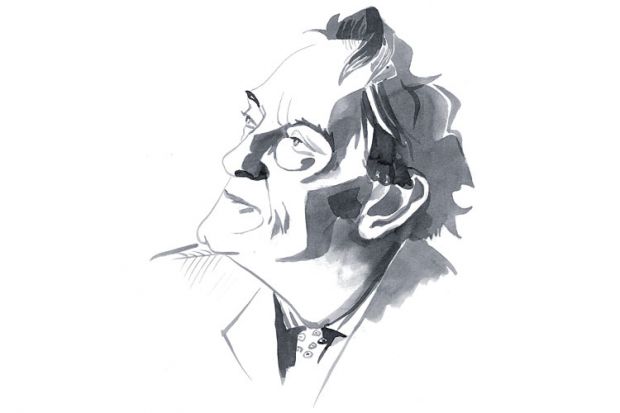I allow students to present written work in any of the few languages I can read. Most foreigners among them, however, are hoping for careers in the US and must practise English. It is fascinating to follow their efforts.
I have one Chinese and one Peruvian graduate. Both write English with more power and accuracy than many of their native classmates, because they have to think hard about every word, phrase, clause, sentence and paragraph. Their styles, however, bear the imprint of their homelands, because the literary models, allusions and imagery that infuse every good writer’s work are products of education, and if you spend your school years in Peru or China then all the accretions from reading at a susceptible time of your life will be Peruvian or Chinese. My Peruvian’s English belongs in the bullring – rotund with elaborate clauses that spread over the page like bloodstains or reach across it slowly like shafts of shade. The Chinese student, by contrast, writes spare sentences that seem to advance in jerks, as if he were translating directly from his own language. Occasionally they ask me for help, usually in elucidating English idioms, which I, too, often find baffling. “A hot potato?” Is that good or bad? “Like a duck in a storm?” Why duck? Why storm? “In his cross hairs?” I have to think about that one. It means “accurately targeted” in allusion to the fine lines across a sniper rifle’s sights.
My students sharpen my awareness of something that I have long known from experience: one does not really know a language with which one is familiar until one has tried to translate it into something else. Terms of previously unquestioned subtlety suddenly reveal their depths. Idioms one formerly used glibly, without sensing their full possibilities, become fresh and impactful. When I worked on the Hakluyt Society’s translation of the journals of Alessandro Malaspina, “the Captain Cook of the Spanish Empire”, I thought I already knew the text, but the problems of finding English equivalents made me realise that much of it had washed over me, without my subjecting it to due scrutiny, because my expectation that I would understand it numbed my alertness.
Translation is the hardest of literary arts. Not only does a translator have to know at least two languages well, but he or she must also be at least as good a writer, in the genre in question, as the author of the original text – good enough to say the same things differently but equally well. A translator must cross abysms of culture to find ways not just of repeating or paraphrasing the original in a new language, but also of transposing the original writer’s world into an environment alien to it. Every allusion, every quotation, every reference to weather, landscape, customs, must have a match, which is usually hard to find. The translator must craft a style and rhythm that has the same resonance and impact as in the original, despite differences in the way words sound in contrasting tongues. Names, puns, jokes, gradations of irony, assumptions about class and faith and sex and politics are likely to vary between translated and untranslated versions and the task of rendering them faithfully without loss of timbre tortures you as you translate.
The task of a translator is on my mind because I have to contribute a piece about it to a Festschrift for a Spanish writer whose work I turned into English many years ago. So narrow is the dance floor of the music of time that, by chance, his wife was recently commissioned to translate an English book of mine into Spanish. “Traduttore, tradittore.” The work I did, on a writer I admired and to whom I was determined to do justice, made me understand why the line between treason and translation is so easily transgressed. Translation, I found, has to be transformation, because to succeed in English as well as my writer succeeded in Spanish you have to contrive different effects – cutting out abstract terms, increasing the ratio of verbs to nouns, making epigrams pithier; and all this in spite of the fact that my writer was one of the most concise and economical in Spain. Sometimes, words drag so much historical baggage along that no one unfamiliar with the original language and cultural context can hope to understand even the most felicitously devised translation. How, for instance, would one translate, from English, “Dunkirk spirit” or “excessive protest” or “proud to be British” into anything foreign? Salvador de Madariaga used to say that national character – if there is such a thing – consists of what is untranslatable. He cited “fair play” in English, “le droit” in French.
From my experience at both ends of the translating process I draw two lessons: first, to be sure that you know your own language, translate bits of it into others; second, to perfect your own art of writing, practise translation. A further, inescapable conclusion is that everyone who aspires to write well must know more than one language. That is why languages should be part of the curriculum, not to communicate with foreigners, or make money out of them, or read the menu when on holiday in Cannes or Cancún, but in pursuit of the object of all education: to Know Thyself.
Felipe Fernández-Armesto is William P. Reynolds professor of history, University of Notre Dame in the US.
POSTSCRIPT:
Article originally published as: That tricky mot juste (11 June 2015)
Register to continue
Why register?
- Registration is free and only takes a moment
- Once registered, you can read 3 articles a month
- Sign up for our newsletter
Subscribe
Or subscribe for unlimited access to:
- Unlimited access to news, views, insights & reviews
- Digital editions
- Digital access to THE’s university and college rankings analysis
Already registered or a current subscriber? Login




